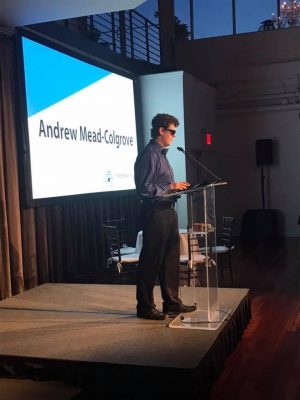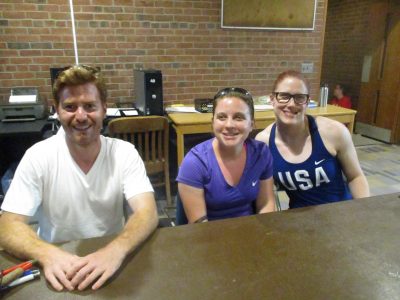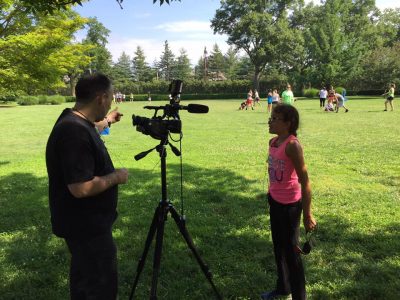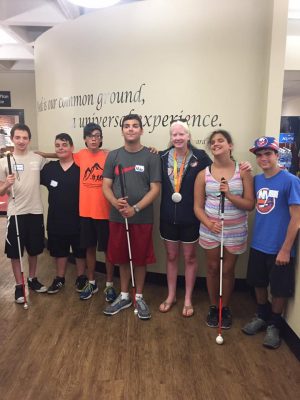By June Converse.
Advocacy Is A Sport
Andrew, an 8th grader, loves to play sports. He especially loves goalball. But he hated sports at school. His physical education teacher didn’t understand how Andrew could participate. She had her heart in the right place, but she didn’t know what she didn’t know. Andrew was excluded.
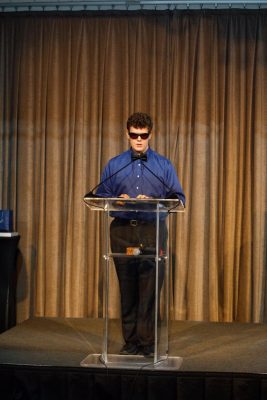
What do an Adaptive Physical Education professor and a Theatre professor have in common? How can a Theatre professor impact a sports camp for children who are visually impaired?
Lauren Lieberman and Ruth Childs are both professors at the College of Brockport in New York. Professionally their lives should never cross. But they are both runners. Twenty years ago, they began to run together. Soon they became more than running partners.
Ruth Childs is an Associate Professor of Theater at the College of Brockport. She teaches Theater, Acting, Improvisation and Public Speaking. During one of their runs, Lauren was discussing her plans for an upcoming Camp Abilities in Brockport. As friends do, Ruth listened and offered an opinion and an idea…
“They [the campers] can have a special week but if their day-to-day life remains unchanged, that’s unacceptable.”
An Idea Becomes A Program
While part of Camp Abilities has always gone beyond learning to play goalball, it wasn’t until this conversation that Self Advocacy became a PROGRAM. A focus. A priority.
“If they go back and nothing changes – if they don’t get to participate in sports, if they can’t be on the cross country team, if they have a teacher who doesn’t understand how to make accommodations for them — what’s the point?” ~ Ruth
Ruth knew that her experience with Acting, Improvisation and Public Speaking could be used to help the campers go home and create change. It was simple – and profound.
Camp Abilities and Self-Advocacy
If I want to learn to play pickleball, the path is clear. First, I set my goal to learn pickleball. Next, I gather the necessary tools. Then, I ask someone to teach me. I practice. I listen to coaches, make adjustments. Practice again. Soon, I’ll be on the court and scoring points. Ruth’s goal is to make learning to speak up for oneself just as straightforward. “I want to demystify the process.”
At the opening ceremonies, Ruth explains to the campers they will be learning to speak up for themselves, to ask for what they want and to help coaches and teachers provide what they need to achieve their goals.
First, she tells the camper to define a CLEAR GOAL. “Something you really want to participate in.”
Once the goal is determined, the next step is to MAKE A PLAN. Ruth provides each camper with a clearly outlined script. The script leans heavily on the model for persuasive speaking.
Being Persuasive
Persuasive speaking forces the speaker to find ways to connect. Ruth stresses with the campers the importance of:
- Vocal variety (speed, volume, word emphasis)
- Posture
- Eye Contact
- Preparation and Rehearsal
She instructs the campers to talk to their coaches and teachers in a “calm, organized manner”.
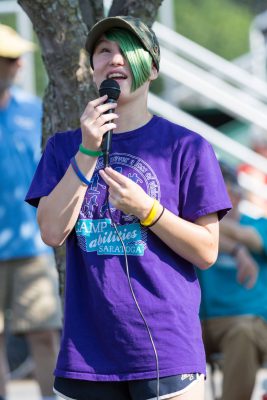
Three Point Process
The script has three distinct features. First, FOCUS ON SELF. “I felt really good when I played soccer.” OR “I found soccer was a sport that made me feel really happy.” OR “I met a Paralympian who plays the sport and I was inspired.”
Second, STATE A CLEAR GOAL. “I wish to participate on the soccer team.” Ruth says this is often the most difficult component for anyone to grasp. The goal needs to be short and direct. Concise and achievable.
Third, MAKE IT EASY. Each camper is provided a comprehensive checklist of modifications for each sport, including equipment, modifications and resources. “A simple modification for me to use is a yellow ball. I can see this better on the green field. An additional modification would be yellow pinnies. We can get these pinnies through US Games and here is the website.”
All teachers and coaches want what’s best for their students. The problem often comes when they don’t know how to help or modify. The athlete can guide the coach to the resources. If a coach knows how to make the modification and how to obtain the necessary materials, the athlete has taken away excuses. But, even more, the athlete has shown his or her commitment to the sport.
While at Camp Abilities, Andrew dreamed about what he wanted in physical education and sports in high school. He wanted something different—something more. After writing his script and practicing it with his counselors, he went home and spoke with his high school athletic director and principal.
A Script and A Voice
The script is tangible. But Ruth also stresses with the campers the need to FIND THEIR VOICE. Finding your voice is about being COMFORTABLE SHARING. In order to persuade someone, you have to be authentic and vulnerable. But you also have to FIT THE ENVIRONMENT. How we share and what we share will change based on who we are speaking to. We speak one way to Mom and another to a coach or to peers or to a venture capitalist. I decided to term this: APPROPRIATE AUTHENTICITY.
“Our authentic self is the most persuasive.” ~ Ruth
Practice Makes Perfect
No one is born with the ability to speak persuasively. Like kicking a soccer ball, speaking up for yourself takes practice and coaching and still more practice. Part of the program at Camp Abilities requires the campers to not only develop a script, but to practice daily with their counselors. The counselor gives tips for improvement. Every day, the camper fine tunes their script and builds confidence on the field and off.
“I enjoy working with the individual campers. I make myself available as much as I can. Sometimes I hang out by the soccer fields ready to listen.” ~ Ruth
What Happens After Camp
Each camper is asked to MAKE AN APPOINTMENT with the coach or teacher. Making an appointment assures the athlete has the teacher’s attention and also shows the athlete’s serious attitude.
Many campers leave Camp Abilities with a love of sport and a lifelong devotion to physical activity. But ALL campers leave with a new skill – a skill that will provide exponential benefits. The camper can take their new speaking confidence into their careers, their relationships, their life.
“This is a trust process. We don’t always win. But we can always feel good that we tried. We are successful when we try.” ~ Ruth
Andrew started high school in September with a guarantee to establish a goalball team. He was so persuasive – so sincere and prepared – they are providing a paid coach and uniforms! Andrew was, and will continue to be, a Self-Advocate.
The Future of the Self-Advocacy Program
Ruth and Lauren presented the Self-Advocacy Program to the International Symposium on Physical Activity and Visual Impairment or Deafblindness in Edinburgh, Scotland in May 2019. They have also co-authored an article for the Journal of Visual Impairment and Blindness. They are bringing awareness to the necessity for self-advocacy and building collaborative relationships.
The goal, of course, is to refine, package, and implement the Self-Advocacy Program into Camp Abilities all across the world.
Camp Abilities can and will be more than a “special week”. Camp Abilities will ensure children who are blind, visually impaired and deafblind FIND THEIR VOICE and ASK FOR INCLUSION.
All children MUST be included. We must TEACH OUR CHILDREN TO CONFIDENTLY ASK. No coaches or teachers want to marginalize their students. Camp Abilities – and the campers – are showing the coaches how easy it is to include.
For a library of valuable resources, including videos and modification details: Instructional Materials (campabilities.org)
Next week, we will provide a list of Objections and Counter Arguments from our campers.
~submitted by June Converse
~Believe You Can Achieve!~

